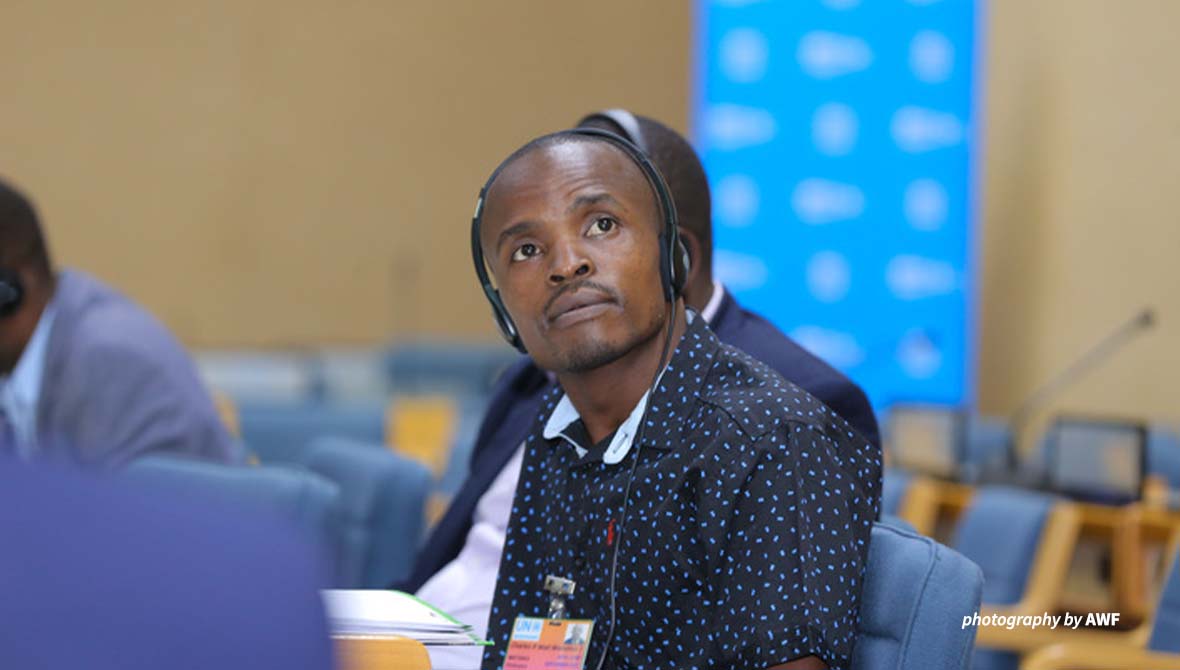Chance Conservationists: An economist championing to protect Zimbabwe’s natural heritage

Being born in Nyanga, a tourist town endowed with rich biodiversity within its proximity, compelled me to pursue a profession in conservation. For those who have no idea about Nyanga, it is a majestic town that houses Nyanga Mountains—one of the Key Biodiversity Areas (KBA) of international significance with Zimbabwe’s highest mountain, Mount Nyangani. Nyanga is also home to Mutarazi Falls, the highest waterfall in the country and the second highest in Africa, regarded as one of the natural wonders of the world. The town is home to key species such as antelopes, zebras, waterbucks, kudus, elands, and predators like leopards, hyenas, and the occasional lions from the Mozambican lowlands.
I fondly remember the breathtaking green Nyanga terrain around where I grew up, and it now seems like a distant memory due to deforestation and other threats, which have taken a toll on the rich biodiversity in the area. The Global Forest Watch reported that from 2001 to 2022, Nyanga lost 27.3 kilohectares of tree cover, equivalent to 32% decrease in tree cover since the beginning of the century. A lot needs to be done, and I believe conservation careers are critical now more than ever to reverse this biodiversity loss.
At the early stages of my career as an economist, I focused on socioeconomic development issues with limited attention to conservation. However, attending a masterclass on Natural Resource Management organized by the Macroeconomic and Financial Management Institute for Eastern and Southern Africa (MEFMI) and the International Monetary Fund (IMF) in 2013 was my turning point.
Prior to joining AWF, I worked for the Zimbabwe Economic Policy Analysis and Research Unit (ZEPARU), now known as the Zimbabwe Economic Policy Analysis and Research Institute (ZEPARI), for close to a decade. As a Research Fellow who was responsible for evidence-based policy analysis, research, and capacity building, I authored and co-authored more than 30 research reports that have provided input into the policymaking processes in Zimbabwe and beyond.
When I joined AWF in 2021, I was tasked with coordinating the compilation of the Zimbabwe Biodiversity Economy (ZBE) Assessment, working closely with a team of consultants, experts, and policymakers. This inaugural assessment in Zimbabwe gives a comprehensive overview of the value and contribution of biodiversity to the economy of Zimbabwe. The assessment provides a high-level blueprint that identifies opportunities for investment in the biodiversity economy of Zimbabwe, recommendations on business and financial models, and overall reforms required to unlock the potential of Zimbabwe’s biodiversity economy. In addition, the assessment provides a roadmap for developing a framework for natural capital accounting for Zimbabwe.
You may be wondering what a framework for natural capital accounting and an investment blueprint is and why this needs to be developed. This framework is the systematic collection and reporting of information on the extent, condition, value, and contribution of natural capital, such as ecosystems, plants, animals, forests, water resources, land, and other forms of natural capital to the economy.
Through the ZBE assessment, AWF has managed to influence several policy positions in the wildlife industry of Zimbabwe. The assessment generated several recommendations that have been instrumental in shaping policies that are currently being reviewed in Zimbabwe. The Government of Zimbabwe, through the Ministry of Environment, Climate, Tourism and Hospitality Industry, has made a deliberate decision to support the development of the biodiversity economy at a national level and began mobilizing funds for that. Young people have a huge role to play in promoting biodiversity economies by coming up with innovative business models that put nature at the core of business enterprises. They can also tap into various business opportunities presented in the ZBE report once the document is made public.
In the next five years, I envision being an influential expert on natural capital accounting and biodiversity economy, influencing decision-making processes to integrate and mainstream environment and biodiversity. The opportunity to be in the first cohort of the AWF Charles R Wall Young African Policy Fellows Program has helped me gain more knowledge, skills, and networks to deal with international environmental governance issues. Environmental and biodiversity issues cut across the board, and there is a need for concerted efforts from the government and society to tackle these issues.
Conservation offers business and employment opportunities, and I am glad numerous sectors have started embracing and promoting conservation as a solution. Having had the opportunity to be in the room when both the Kunming-Montreal Global Biodiversity Framework and the APAC Kigali Call to Action were adopted, I am both hopeful and excited to be a part of the generation that is contributing to the narrative shift within the continent.
This week, I will be participating in the 2023 Business of Conservation Conference (BCC), a global conference that gathers stakeholders from different sectors to discuss ways of unlocking economic value from Africa’s biodiversity. During the BCC, AWF will be highlighting key initiatives we have been working on towards unlocking the value of nature through conservation and development planning, integrating conservation impact into agricultural value chains, and developing national blueprints for biodiversity economies. The BCC offers opportunities for young people to learn and grow their careers in conservation as a business that contributes towards sustainable development.
Above all, I strongly urge everyone with an interest in biodiversity conservation to go for it and contribute meaningfully. I believe all biodiversity-rich landscapes will be in safe hands if stakeholders, including private sector businesses, policymakers, and authorities, come together to create robust policies that concurrently promote development and business. That way, the nexus between economics and conservation can be fully realized.